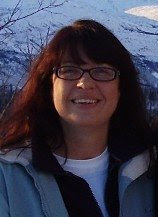
We all struggle to adapt to new environments, and my experiences over the past few months have given me a deeper understanding of the anxiety, insecurity, and sometimes--sheer terror--that accompanies leaving everything and everyone you know behind and being transplanted somewhere new...even when that new place is a wonderful place to be.
This is Mickey. He's a 100 pound, four-year-old Alaskan Malamute, and a few weeks ago, his family had to give him up because they lost their home. We're adopting him from a local Rescue group, and during my search for articles and information on how to make the transition go as smoothly for him as possible, I ran across an article that encouraged new owners to try to see this process from the dog's perspective. Since Mickey's personality tends to be a little anxious anyway, I took the advice to heart.
Imagine--it suggested--that you are suddenly plucked from your home and family and placed into a noisy kennel, a brand new environment full of people and other dogs you don't know. New people come to visit you, moving in and out of your life like dream images, until one day, you're loaded into the car and taken somewhere new yet again. The new people in your life might be wonderful, and the new home may have everything you ever wanted--except that it's not your old home, and your family is still gone. The article suggested that it can take months for a dog to adjust to a new home--and that this is a fact that surprises many new owners.
Not me.
I've always dreamed of living in Alaska. I loved the idea of buying a home that had an amazing view of the mountains, where wildlife became a part of everyday life, and where each new day brought an increasing awareness of our place in the universe. And while I remember our years in North Dakota fondly--primarily because of the amazing and wonderful people who populated my life while I was there--I never planned to make it "home." And yet, when I moved 4,000 miles away to Alaska, it rocked my world.
I traveled halfway across the country by car, and then spent 3.5 days on a ferry--before arriving in Haines and driving through blinding snow on mountain roads for two days. For many, the trip would have been an adventure; for me, it was traumatic. Like Mickey, I tend to get a little anxious when I'm yanked so thoroughly out of my comfort zone. I'm not one of those people who thrives on change; I cling to routines, to the familiar, because chaos is destabilizing and frightening and tends to make me feel insecure.
Like Mickey, I had to leave my friends, my family, my community, and the life I had made for myself there. Suddenly, I had to learn new rules, a new town, a new job, and went through the stressful process of buying a home for the first time. The trauma lasted for months.
Last week, though, I came home from work, and as I walked through the front door, I felt that sudden, comforting relief that you feel when you come home...and I realized that, at some point, this had become my new comfort zone, my new home, and that slowly--but surely--I was acclimating to my new environment. I know the neighbors (and their dogs and kids) by their first names. I know the fastest way to get to campus, and I'm confident enough to argue with Google maps about the best route at a given time of day. I know the names of the mountains that surround our home, and I'm picking up the lingo: "the bush" instead of "the wilderness," "Cheechako" for "greenhorn," "break up" for "spring," and "Lower 48" for everything...well, in the Lower 48.
Yes, it will take Mickey time to adjust, and I'll be patient for as long as it takes him to decide that he, too, is finally home. It's all too easy to look at the situation from his perspective after the events of the past few months, and especially because he and I seem to share a cautious, anxious approach to new experiences. In fact, we'll probably make perfect companions for that very reason--then, when L. does take us out for new adventures that stretch our comfort zones, we can find solace in the idea that either way, we have each other to lean on...






